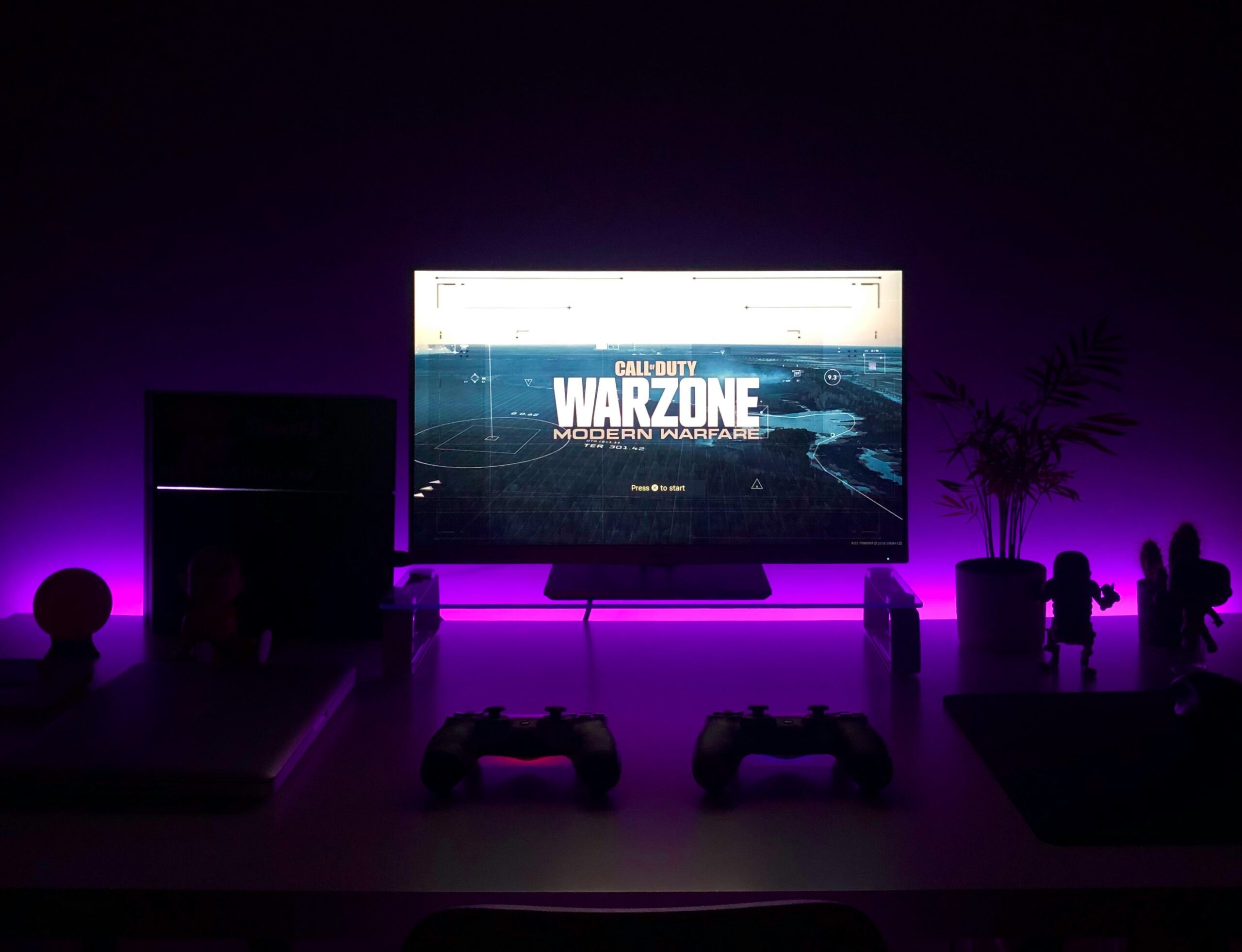From Casual to Pro: Tips for Breaking into the E-Sports Scene
 Photo by Muktasim Azlan on Unsplash
Photo by Muktasim Azlan on Unsplash Introduction to E-Sports
The world of e-sports, short for electronic sports, has evolved dramatically from its humble beginnings as a niche hobby to a globally recognized competitive arena. E-sports encompasses organized, multiplayer video game competitions, particularly among professional players, whether individuals or teams. This digital phenomenon has not only captivated the imagination of millions but also redefined competitive gaming on a large scale.
The history of e-sports can be traced back to the early 1970s, with rudimentary video game competitions such as Spacewar! However, the actual boom began in the late 1990s and early 2000s, fueled by advancements in internet technology and popular games such as StarCraft and Counter-Strike. These games laid the groundwork for an organized structure of tournaments, professional teams, and dedicated fan bases.
Today, e-sports is a multi-billion-dollar industry, commanding the attention of major sponsors, media outlets, and a diverse international audience. Popular titles like League of Legends, Dota 2, and Fortnite have not only garnered massive followings but also offer lucrative prize pools, rivaling those in traditional sports. The growth is not limited to players alone; streamers, commentators, analysts, and coaches have all found sustainable careers within this burgeoning field.
With viewership numbers surpassing those of traditional sports events, the current state of the e-sports industry is flourishing. Major events are held in prestigious venues and are watched by millions online. Investment from multinational corporations and endorsement deals have further legitimized e-sports as a career path. Additionally, educational institutions now offer scholarships and programs focused on e-sports, indicating its acceptance as a professional pursuit.
In summary, e-sports has rapidly transformed from a casual pastime to a professional enterprise, offering diverse career opportunities. For aspiring professionals, understanding the evolution and scope of e-sports is crucial for navigating this dynamic industry successfully. This blog post will provide you with essential tips and strategies to make your mark in the world of e-sports, whether as a player or in another professional capacity.
Finding Your Game
Embarking on a journey in the e-sports scene begins with a critical decision: finding the right game that aligns with your interests, skills, and long-term goals. The e-sports landscape is vast, with various genres like first-person shooters, multiplayer online battle arenas, real-time strategy, and sports simulations each requiring distinct skill sets. Identifying a game that not only captivates you but also complements your natural abilities is paramount to your success.
Different games necessitate unique strategies and competencies. For instance, first-person shooters like “Counter-Strike: Global Offensive” or “Call of Duty” demand quick reflexes, precision aiming, and tactical teamwork. On the other hand, multiplayer online battle arenas (MOBAs) such as “League of Legends” or “Dota 2” require strategic thinking, map awareness, and cooperative synergy with your team. Understanding the intricacies of each genre can guide you in selecting a game that plays to your strengths.
To test and evaluate various games, take the time to research and immerse yourself in different genres. Watch professional tournaments, join gaming communities, and participate in casual or ranked matches. This exploration phase will provide valuable insights into what excites you and where you naturally excel. Additionally, consider how the game’s competitive scene aligns with your long-term ambitions. Some games have larger professional leagues and more lucrative opportunities, which could be a decisive factor in your choice.
Once you have identified a game that suits you, commit to it. Specializing in one game allows you to build expertise and establish a reputation within that specific community. Consistency is key, as dedicating yourself to a single game fosters deeper understanding, strategic acumen, and skill mastery. Building credibility in the e-sports scene hinges on your ability to demonstrate proficiency and reliability in your chosen game.
In conclusion, finding your game is a foundational step in transitioning from a casual player to a pro in the e-sports scene. By thoroughly evaluating different games and committing to one that resonates with your interests and skills, you set the stage for a successful and fulfilling e-sports career.
Building Skills Through Practice and Training
Breaking into the e-sports scene requires a dedicated approach to both practice and training. Effective practice routines are the cornerstone of skill improvement, encompassing solo play, team practice, and an in-depth understanding of game mechanics, strategies, and meta changes. For aspiring professional players, structuring practice sessions with specific goals is crucial. This enables a focused and purposeful training regimen, increasing the chances of progression.
When it comes to solo practice, players should focus on mastering basic game mechanics and individual skill sets. Utilize training modes to refine skills such as aim, speed, and accuracy. Engaging in replay analysis allows players to identify strengths and weaknesses, providing insights into their gameplay that can inform future practice sessions. It is also important to keep abreast of meta changes and adapt strategies accordingly. Regularly reviewing patch notes and watching high-level gameplay can help players stay competitive and informed.
Team practice is equally vital for those looking to break into the e-sports scene. Effective communication and synergy with teammates are essential for success in competitive play. Structured team practices should include scrimmages, strategy discussions, and post-match analyses. Setting collective objectives and regularly reviewing team performances can significantly enhance overall gameplay and teamwork.
Another crucial aspect of practice routines is maintaining physical fitness and mental well-being. E-sports, like any other professional sport, demands a high level of concentration and stamina. Incorporating physical exercises, such as cardiovascular workouts and stretching, can improve overall health and endurance. Mental well-being should not be neglected; practices such as mindfulness, adequate sleep, and maintaining a healthy diet play a pivotal role in sustaining high performance levels and preventing burnout.
To sum up, building skills in e-sports requires a structured approach to both solo and team practices, a continuous learning attitude towards game mechanics and meta changes, and a balanced focus on physical and mental health. Consistent effort in these areas will prepare aspiring players to move from casual to professional gaming successfully.
Understanding the Competitive Scene
The structure of competitive e-sports can appear complex to newcomers, but understanding its various layers is essential for anyone aspiring to break into the scene. At the grassroots level, local tournaments provide a platform for budding talent to showcase their skills. These events often serve as springboards to more significant competitions, allowing players to gain experience and build a reputation within the community.
As one progresses, ladder matches and qualifiers become critical components of the e-sports landscape. Ladder matches involve ranking systems where players or teams compete to ascend leaderboards, earning their way to higher-level competitions. Qualifiers, on the other hand, are preliminary rounds that filter through participants, selecting the best contenders for major events. Both formats demand a consistent display of competence and dedication, rewarding those who can maintain top-tier performance levels.
Ultimately, the pinnacle of the e-sports world lies in major events such as international leagues and championships. These grand-scale tournaments attract top-tier talent from across the globe and are often broadcasted to massive audiences, both online and offline. Performing well in these high-stakes arenas not only garners significant rewards but also provides unmatched visibility and recognition within the e-sports community.
Visibility is crucial in e-sports, and one of the most effective ways to achieve it is through active participation in various competitions. Entering local tournaments, climbing the ladder ranks, and competing in qualifiers can offer invaluable exposure. However, success in e-sports isn’t solely about individual skill; networking plays an integral role. Establishing connections with other players, coaches, and industry professionals can lead to mentorship opportunities, team invitations, and even sponsorships. Building a solid network can open doors that pure talent might not always unlock, making it an indispensable aspect of forging a successful e-sports career.
Equipment and Setup Essentials
Breaking into the e-sports scene requires not only skill but also the right equipment and setup. The foundation of this setup starts with selecting an appropriate gaming PC or console. A high-performance gaming PC, featuring a powerful processor, a state-of-the-art graphics card, and ample RAM, ensures that games run smoothly and without lag. For console gamers, opting for the latest versions, such as the PlayStation 5 or Xbox Series X, can provide a seamless gaming experience.
Monitors are equally crucial. Competitive gamers often prefer monitors with high refresh rates (144Hz or more) and low response times, enhancing reaction times and visual clarity. For peripherals, investing in a reliable gaming mouse and keyboard is essential. Gamers should look for peripherals with customizable buttons and mechanical keys that provide tactile feedback for precision during gameplay. Additionally, a quality headset with clear audio and a sensitive microphone can offer a competitive edge by facilitating effective communication with teammates.
Beyond the core equipment, a stable and fast internet connection is indispensable. Opt for wired Ethernet connections over Wi-Fi to minimize latency and ensure consistent connectivity. This can be the difference between winning and losing in fast-paced, reaction-based games.
Creating a comfortable gaming environment is also paramount. Ergonomics play a vital role in maintaining peak performance and reducing physical strain. Select an adjustable gaming chair that supports good posture and a desk that accommodates all gaming equipment without clutter. Proper lighting and minimizing screen glare can alleviate eye strain, while maintaining an ideal room temperature ensures comfort during extended gaming sessions.
Ultimately, the right combination of equipment and an optimized setup can significantly enhance one’s ability to perform and compete in the e-sports arena. By investing in and arranging equipment thoughtfully, gamers can create a conducive environment that not only supports their gaming ambitions but also promotes overall well-being.
Joining a Team or Starting Your Own
When venturing into the e-sports landscape, one of the initial decisions to make is whether to join an existing team or create your own. Each choice comes with its distinct advantages and challenges. Understanding the dynamics of both options can help aspiring players navigate this critical juncture effectively.
Joining an established e-sports team offers immediate benefits such as a pre-existing structure, experienced players, and often, greater exposure in tournaments. To find and apply to established teams, start by researching teams that participate in your favorite games. Look for postings on competitive gaming forums, social media, and official team websites. Teams generally seek players with strong gaming skills, a good attitude towards teamwork, and excellent communication abilities. To market yourself effectively, create a compelling portfolio that highlights your gaming achievements, skills, and streams or gameplay footage. Networking at e-sports events and participating in online communities can also increase your visibility to team recruiters.
For those with entrepreneurial spirits, starting your own e-sports team offers a unique opportunity to build from the ground up. Begin by selecting the game your team will focus on and clearly define your team’s goals and values. Recruitment should target players who not only possess strong individual skills but also show a willingness to collaborate and grow with the team. Utilize gaming forums, social media groups, and local gaming communities to find potential members. Assess prospective players beyond their in-game performance – consider their communication style, adaptability, and drive.
Successful team dynamics hinge on effective communication and coordination. Regular practice sessions and strategy meetings are essential to developing synergy among members. Leverage communication tools like Discord for real-time discussions and to build a sense of community. Establish roles and responsibilities within the team to ensure that every member understands their contribution to collective objectives. Encourage constructive feedback and foster an environment where continuous improvement is valued.
Ultimately, whether you decide to join an existing e-sports team or create your own, understanding the intricacies of both pathways will equip you with the knowledge to make a well-informed choice, setting the stage for your journey into the competitive e-sports arena.
Building Your Personal Brand
Building a personal brand in the e-sports industry is a critical step for anyone aspiring to transition from a casual player to a professional. Establishing a strong online presence is the cornerstone of personal branding. This includes creating a consistent and recognizable persona across various platforms like Twitch, YouTube, Twitter, and Instagram. Engaging actively with the gaming community is equally important. Participation in discussions, forums, and collaborative games helps in building a network and gaining visibility among peers and potential sponsors.
Utilizing social media platforms to their fullest potential is crucial in this digital age. Regularly updating your streaming channel with high-quality content that resonates with your audience, as well as interacting with your followers through comments and live chats, will foster a loyal following. Live streaming is particularly powerful in e-sports. It’s not just about playing the game; your personality, commentary, and interactions with the audience can significantly enhance viewer engagement. Additionally, creating diverse content, such as tutorials, reviews, and highlight reels, can attract a wider audience base.
Building a loyal following doesn’t happen overnight. It requires consistent effort, genuine interactions, and attention to feedback from your audience. Quality consistency is key—ensuring that every piece of content you produce meets a certain standard will help maintain and grow your audience. Collaborating with other content creators and participating in e-sports events can also boost your visibility and bring in more followers.
When it comes to sponsorships and partnerships, it’s essential to demonstrate the value you can offer. Brands are often looking for influencers who can deliver their message authentically. Engaging and loyal followers are appealing to brands looking to invest in sponsorships. Understanding how to monetize your brand effectively through merchandise, affiliate marketing, and ad revenue can turn your passion into a profitable career. A strong personal brand not only attracts sponsors but also holds the potential for a lasting impact in the rapidly growing e-sports industry.
Navigating Career Opportunities in E-Sports
Breaking into the e-sports scene is often perceived as solely about becoming a professional player. However, the e-sports industry offers a myriad of career paths that go beyond competitive gaming. Aspiring professionals can explore roles such as coaching, shoutcasting, content creation, and management, each demanding its unique set of skills and qualifications.
Coaching in e-sports requires a deep understanding of the game mechanics, player psychology, and strategic planning. To start a career in coaching, one can begin by mentoring amateur teams or working with community groups. Gaining hands-on experience and continuously updating tactical knowledge are critical steps. Online courses and certifications, like those offered by institutions such as the Esports Coaching Academy, can also provide a foundational framework.
Shoutcasting, or e-sports commentary, is another flourishing career within this dynamic industry. Successful shoutcasters possess both in-depth game knowledge and exceptional communication skills. Building a portfolio often starts with covering local tournaments or creating commentary content on streaming platforms like Twitch or YouTube. Networking with industry professionals and studying the styles of established shoutcasters are effective ways to refine this craft.
Content creation is indispensable in e-sports, with opportunities ranging from video production to writing and digital marketing. Aspiring content creators should focus on honing their skills in areas like editing, storytelling, and social media management. Platforms such as Skillshare and Coursera offer courses in these domains, making it easier to build an impressive portfolio that resonates with e-sports audiences.
Management roles in e-sports, such as team management or event coordination, require a robust understanding of business operations, marketing strategies, and event planning. Pursuing degrees in business administration or sports management, along with internships at e-sports organizations, can provide valuable experience. The Esports Management Academy is one resource where individuals can learn about the intricacies of managing teams and organizing events.
The e-sports industry is rapidly evolving, requiring continual learning and adaptation. Resources like online webinars, industry forums, and professional associations, including the Esports Professional Association, can serve as valuable tools for staying updated and connected. By exploring these diverse career paths and leveraging available educational resources, individuals can carve out significant and rewarding careers within the multifaceted world of e-sports.





Tidak ada komentar